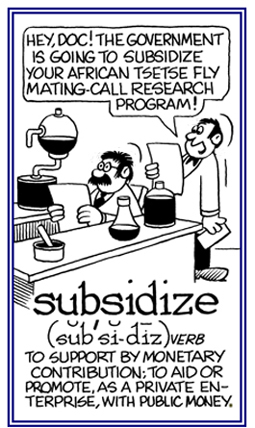sed-, sedat-, -sid, -sess
(Latin: sit, sitting)
subsidiary (adjective), more subsidiary, most subsidiary
1. Serving to help, assist, or supplement; furnishing assistance or supplementary supplies; auxiliary, tributary, supplementary.
2. A subsidiary thing; something which furnishes assistance or additional supplies; an aid.
2. A subsidiary thing; something which furnishes assistance or additional supplies; an aid.
subsidize (verb), subsidizes; subsidized; subsidizing
1. To contribute money to somebody or something, especially to give a government grant to a private company, an organization, or a charity to help it to continue to be active: The bill before the government was to end the policy which was subsidizing political parties with the use of tax payers' money.
2. To pay for a part of something or to reduce the cost of something by funding it with money: Because she was only working part time, Trudy was grateful that the city was subsidizing her rent for the first three months.

© ALL rights are reserved.
Go to this Word A Day Revisited Index
2. To pay for a part of something or to reduce the cost of something by funding it with money: Because she was only working part time, Trudy was grateful that the city was subsidizing her rent for the first three months.

Go to this Word A Day Revisited Index
so you can see more of Mickey Bach's cartoons.
1. A grant or gift of money from a government to a private company, organization, or charity to help it to continue functioning.
2. To help with expenses; a monetary gift or a contribution to somebody or something; especially, to pay expenses.
3. A sum of financial aids that are paid, often in accordance with a treaty, by one government to another one in order to have some service in return.
5. Etymology: From Old French subside, "help, aid, contribution"; from Latin subsidium, "help, aid, assistance, (military) reinforcements"; from sub, "behind, near" + sedere, "to sit".
2. To help with expenses; a monetary gift or a contribution to somebody or something; especially, to pay expenses.
3. A sum of financial aids that are paid, often in accordance with a treaty, by one government to another one in order to have some service in return.
5. Etymology: From Old French subside, "help, aid, contribution"; from Latin subsidium, "help, aid, assistance, (military) reinforcements"; from sub, "behind, near" + sedere, "to sit".
supersede (verb), supersedes; superseded; superseding
1. To replace in power, authority, effectiveness, acceptance, use, etc., as by another person or thing: Ted's supervisor retired and was superseded by another qualified administrator.
2. To set aside or to cause to be set aside as void, useless, or obsolete, usually in favor of something else: Sam superseded his old car with a new one.
3. To cause to be set aside; especially, to displace someone or something as inferior or too old: The new edition of the scientific publication was set up to supersede its original magazines.

© ALL rights are reserved.
Go to this Word A Day Revisited Index
2. To set aside or to cause to be set aside as void, useless, or obsolete, usually in favor of something else: Sam superseded his old car with a new one.
3. To cause to be set aside; especially, to displace someone or something as inferior or too old: The new edition of the scientific publication was set up to supersede its original magazines.
No sooner does a person buy a computer than the company brings out a new one that is superseding it.
4. Etymology: from Latin supersedere, literally, "to sit over or above" or "to sit on top of" something; from super, "above" + sedere, "to sit".
Go to this Word A Day Revisited Index
so you can see more of Mickey Bach's cartoons.
The act of replacing one person or thing by another one; especially, by one which is considered to be better or superior.
1. A discontinuance, a stopping, or the end of something: Karen's brother was teasing her without surcease even though she asked him several times to leave her alone.
2. A relief or a consolation: The doctor prescribed drugs that were supposed to be a surcease from the terrible pain that Karl was suffering with after he fell and fractured his arm.

© ALL rights are reserved.
Go to this Word A Day Revisited Index
2. A relief or a consolation: The doctor prescribed drugs that were supposed to be a surcease from the terrible pain that Karl was suffering with after he fell and fractured his arm.

Go to this Word A Day Revisited Index
so you can see more of Mickey Bach's cartoons.
surcease (verb), surceases; surceased; surceasing
1. To stop or to bring something to an end: The neighbors were hoping that the noise from the late outdoor musical would surcease so they could get some sleep.
2. Etymology: from Anglo-French surseser; from Old French sursis, past participle of surseoir, "to refrain, to delay"; from Latin supersedere, "to sit on top of, to stay clear of, to abstain from, to forbear, to refrain from"; from super, "above" + sedere, "to sit".
2. Etymology: from Anglo-French surseser; from Old French sursis, past participle of surseoir, "to refrain, to delay"; from Latin supersedere, "to sit on top of, to stay clear of, to abstain from, to forbear, to refrain from"; from super, "above" + sedere, "to sit".

